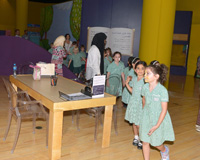Contact Center
.
01 June 2015
The International Children's Day Celebrated at Bahrain National Museum


As part of its keenness to communicate and reach out to all ages in Bahrain, Bahrain National Museum celebrated the International Children's Day on Monday, 1st of June 2015. The museum welcomed all children, accompanied by their families, to enjoy events and activities as part of the exhibition ‘Kalila wa Dimna, Fables Through Time’.
It was obvious in the smiles and laughter that children were having a lot of fun thanks to the interactive activities organized by the exhibition, which will run until 30 September 2015. Imaginative workshops, such as storytelling, were mostly appreciated by the little ones because it presented stories and tales of ‘Kalila wa Dimna’ and brings the characters, their relationships and lessons to life. Children enjoyed painting and drawing bright colors on their faces depicting famous animal characters found in the fables during a face painting workshop. The public toured the different interactive activities and received a beautiful special souvenir; an International Children Day’s stamp.
The display showcases digitally reproduced manuscripts from collections around the world, enriched by original illustrations, and a digital guide to these stories. The storybook app examines the folk tales of Kalila and Dimna, which have been passed down for over 2000 years, across many languages and countries. This app presents three featured stories in dynamic and interactive ways for families to explore, in both English and Arabic languages.
‘Kalila wa Dimna: Fables Across Time’ exhibit, which was created in a partnership between The Children’s Museum of Indianapolis and the Bahrain National Museum, is a startling combination of text, multi-media and a live musical score. This modern theatrical fable is a timely exploration of the mechanics of Empires and the narratives of power, providing a passionate argument for cultural and religious tolerance in the modern Arab and Western worlds. The fables address the moral education of princes through two jackals, Kalila and Dimna, and a host of animal protagonists, but they are more than just a mirror for princes. They illustrate universal human strengths and weaknesses, as well as aspirations for justice and truth.







